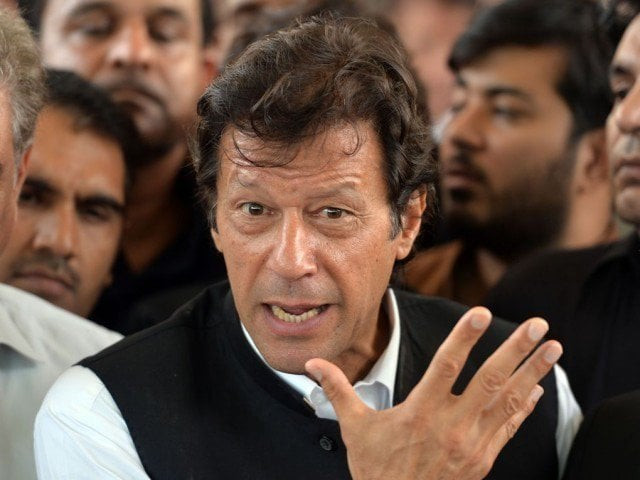IHC dismisses Imran’s petition against ECP
Poll body had barred party heads from running election campaigns in by-elections

After the petition’s dismissal, ECP’s notifications accusing Khan of violating its code of conduct are now in play.
PHOTO:AFP
IHC’s Justice Aamer Farooq, who had earlier restrained the ECP from pronouncing a verdict in a case, dismissed the PTI chairman’s petition just two days before the general election.
After the petition’s dismissal, ECP’s notifications accusing Khan of violating its code of conduct are now in play.
PTI Chairman had approached the IHC against ECP notifications that barred lawmakers and party heads from running election campaigns.
Khan had filed the petition through his counsel Babar Awan, naming the ECP and the commission’s director-general (elections) as respondents in the case.
Petition filed in IHC against Imran for abusive remarks
The counsel contended that his client, as the chairman of PTI, headed various by-election drives all over the country, which was a right guaranteed under the Constitution.
According to the lawyer, the ECP notifications, abridging fundamental rights, had surprised the petitioner “and other democratic forces in the country”.
On April 16, 2015, he pointed out, the ECP had issued a notification, barring the president, prime minister, ministers of state, governors, chief ministers, provincial ministers and advisors to the PM and chief ministers from visiting the constituencies or giving any subscription or donation in such constituencies.
On May 7, 2015, the notification was amended to included MNAs and MPAs among those restricted.
Another such notification was issued on September 16, 2015, the lawyer said.
The counsel contended that the respondents had issued a notification on February 6 last year to the petitioner (Imran) which was “wholly illegal”.
Babar had maintained that inclusion of lawmakers along with the president and PM and others was mala fide on part of the ECP.
He contended that MNAs and MPAs, who did not hold any public office, did not fall in the same category with those who were in power.
Defence ministry defends Imran’s stance on airbase use
The lawyer said that it was obvious that the ECP had only the petitioner – Imran Khan – in mind when it issued such notifications because he “was the only MNA who, having no governmental or official position, would matter the most with the voters in the by-elections”.
Accusing the ECP of abusing authority, Babar Awan said that the poll body had issued a person-specific notification on February 6. “It was (done) with (an) intent to keep only the petitioner out of the campaigns of by-elections.”
Preventing the petitioner, being the head of a party, he said, from campaigning in constituencies where by-elections were to take place was a violation of Articles 16, 17 and 19 of the Constitution.
He requested the court to declare all such notifications and “any other consequential proceedings pending before the ECP” illegal, without lawful authority and of no legal effect.
The court, however, dismissed Khan’s petition after reserving judgment in the case on April 26 this year.



















COMMENTS
Comments are moderated and generally will be posted if they are on-topic and not abusive.
For more information, please see our Comments FAQ